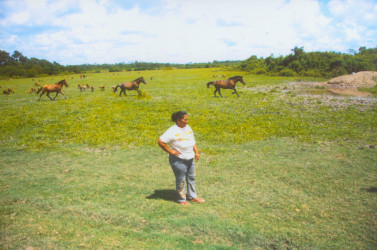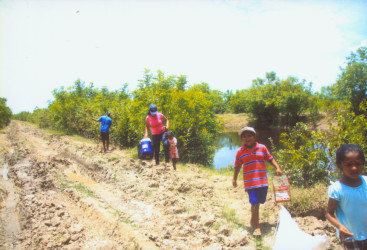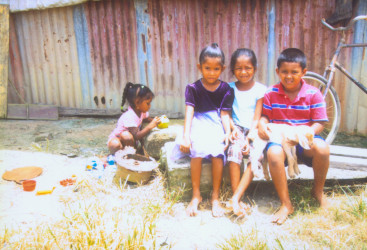When Kamaldai Williams lost her cattle farmer husband who was stabbed to death five years ago during what she says was a dispute between cattle and rice farmers in the Black Bush Polder she took his place at the head of a business enterprise that is usually demanding even for seasoned men. Prior to the tragedy that changed her life, her full-time job was that of a mother to her children, two boys in their twenties who have now become her ‘right hand’ and two girls, both of who are now teachers. All of her children are married and at 45 she is now a grandmother of seven.

Kamaldai, her sons, their wives and their three children live together at Alness Village on the Corentyne. They run a cattle ranch in the Kokerite Savannahs of the Black Bush backlands.
The family own around 600 head of cattle and Kamaldai, far from being a reluctant businesswoman appears to have grown into the job. She explains that it has been a radical transformation. When her husband Hemchand Shivgobin was alive she would visit the ranch but used to only pay minimal attention to “the business.” All that, she said, had to change.

In a business culture that is still male-dominated, her older son, Elvis, serves as a sort of rudder, taking a lead role in business decisions including negotiating. She has become the focal point in major financial decisions.

Kamaldai is only too well aware of the expectation that that point in time is approaching when she will have to involve her sons formally and more fully into the business.
The existing lease for the 300 acres of backlands that accommodate the ranch is in the names of herself and her dead husband. She wants her husband’s name replaced on the lease by that of her elder son, Elvis.
Since 2009 she has been making regular treks to the Lands & Surveys Department at New Amsterdam in order to expedite the process. After six years the process is still incomplete. And the Lands and Surveys Department application for an additional 200 acres of land was met by a requirement of a cattle count. That was done three months ago after which, she says, the Lands and Surveys Department completed an inspection of the facility at a cost of $90,000. Currently, she is waiting.
The ranch house looks out onto a sprawling expanse of land where cattle graze contentedly. At night there is sometimes the concern about jaguars. It is not uncommon to find dead or injured animals the next day.
The ranch house itself is eminently livable. Every day, the sons visit the facility. During the holidays it serves as a resort for her grandchildren. These days, the condition of the dam limits the frequency of Kamaldai’s visits to the ranch. Still, her lower physical profile does not appear to have threatened one bit her role as the matriarch of the family and the head of the business enterprise.
If she is still a relatively young and able-bodied woman Kamaldai makes no secret of her concern that the placement of her son’s name on the lease be completed. “What if something happens to me,” she enquires quizzically.
Her emotional involvement in the ongoing rice/cattle feud that has become a way of life in Black Bush Polder does not appear to have dimmed her enthusiasm for the cattle industry. In recent years she has invested around $3.5 million in upgrading the land, improving drainage and irrigation and ensuring the availability of water and shade.
Tending cattle in the same space with rice fields is a challenge which Kamaldai must confront every day. No one can blame her if she is wary of controversy with the rice farmers.
There is a full-time ranch hand whose primary tasks are to keep the cattle ‘in check’ and to ensure that they are all accounted for.




